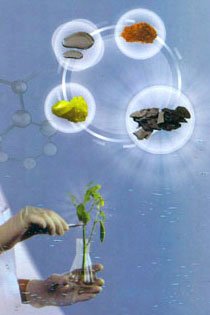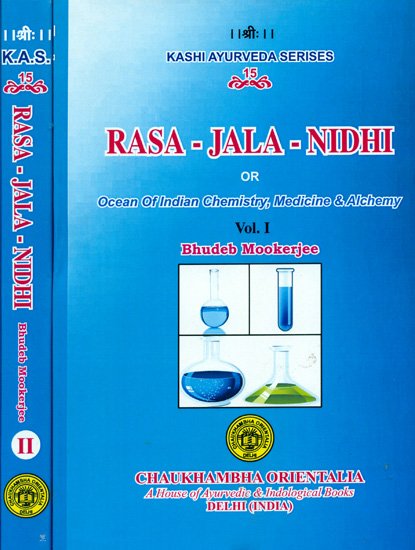Rasa Jala Nidhi, vol 4: Iatrochemistry
by Bhudeb Mookerjee | 1938 | 52,258 words | ISBN-10: 8170305829 | ISBN-13: 9788170305828
This fourth volume of the Rasa-jala-nidhi deals with Rasa-chikitsa-vidya, also known a the science of Iatrchemistry (chemical medicine), a major branch of Ayurveda. It contains Ayurvedic treatments for Fever and Diarrhea. The Rasa-jala-nidhi (“the ocean of Iatrochemistry, or, chemical medicine) is a compendium of Sanskrit verses dealing with ancie...
Part 2 - Nava-jvara (primary fever)
If a healthy man, free from fever for a long time, is attacked with it, such a fever is called nava-jvara.
Varieties of nava-jvara.
Nava-jvara is of two kinds, viz. that caused by one’s own self, due to unhealthy diet, actions, and habits; and that caused by external agencies.
Primary fever, caused by ones own-self.
Unhealthy food, drinks, habits, and actions gradually give rise to an abnormal excess of vayu pitta, and kapha (vide, page 299, vol. II), which pervades the whole system and gradually affects the stomach to such an extent as to be mixed with the undigested part of the chyle to force the digesting heat of the stomach out of it. The heat, thus thrown out, spreads all over the body, and gives rise to fever.
Heat thus thrown out of the stomach, is, however, a common factor in all sorts of fever. Restoration of this digesting heat to its original condition, is followed by a cure of fever.
Primary fever due to external agencies.
These are of four different kinds, and are due to (a) physical shock, (b) possession by evil spirits (c) charms and incantations resorted to by enemies, and (d) curse uttered by superiors, out of disgust. The nature of such a fever is first of all to be ascertained, in respect of the doshas (vayu, pitta, and kapha). Physical shocks, received from strokes of weapons, sticks, etc. and biting of scorpions, mosquitoes, etc give rise to an excess of vayu and pitta. (Fever, due to such shocks, is, therefore, due to an abnormal excess of vayu and pitta). Fever due to poison is attended with facial jaundice, diarrhoea, aversion to food, thirst, pains, and fainting. Fever due to the smell of poisonous creepers, etc. is attended with fainting, head-disease, and vomiting. Fever due to an excessive sexual desire is followed by distraction of the mind, drowsiness, lethargy, aversion to food, pain in the heart, and dryness of face and body. Fever due to fear and grief is followed by delirium, and that due to anger is followed by shivering. Sexual desire, grief, and fear give rise to an excess of vayu; anger gives rise to pitta. Possession by evil spirits is follow ed by laughter, weeping, trembling, and excess of the three doshas. Charms, incantations, and curses give rise to bewilderment and thirst.
Conclusion:
 This concludes ‘Nava-jvara (primary fever)’ included in Bhudeb Mookerjee Rasa Jala Nidhi, vol 4: Initiation, Mercury and Laboratory. The text includes treatments, recipes and remedies and is categorised as Rasa Shastra: an important branch of Ayurveda that specialises in medicinal/ herbal chemistry, alchemy and mineralogy, for the purpose of prolonging and preserving life.
This concludes ‘Nava-jvara (primary fever)’ included in Bhudeb Mookerjee Rasa Jala Nidhi, vol 4: Initiation, Mercury and Laboratory. The text includes treatments, recipes and remedies and is categorised as Rasa Shastra: an important branch of Ayurveda that specialises in medicinal/ herbal chemistry, alchemy and mineralogy, for the purpose of prolonging and preserving life.
